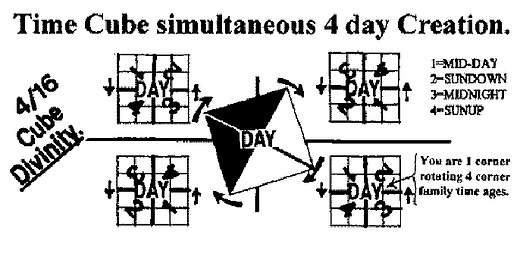The Time Cube test
The media loves to promote hard-right ideas in the name of open-mindedness and ideological diversity. So why don't they ever talk about Time Cube?
Before social media and the bandwidth-intensive media platforms that dominate the internet today, a massive genre of message boards relied on a simple format: users submitted stuff they found online, and then everyone talked about it. Back then, I spent a lot of time on a site like this called Portal of Evil. If you’d like to know more New York magazine…
Keep reading with a 7-day free trial
Subscribe to Carl Beijer to keep reading this post and get 7 days of free access to the full post archives.




